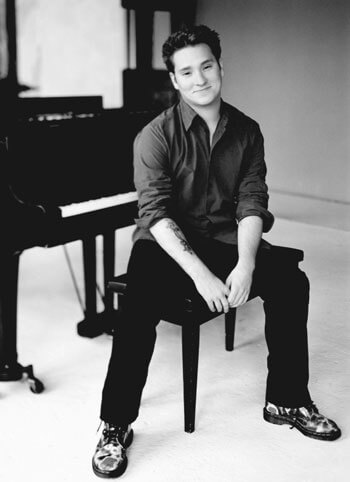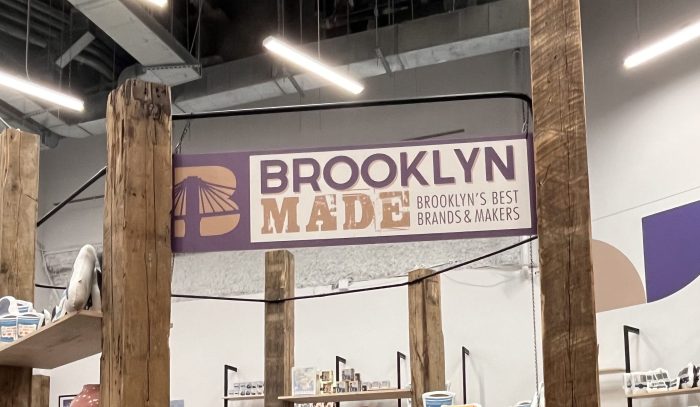A young pop singer has urbane talent without any fancy packaging
Midway through his stunning musical debut at Joe’s Pub the other evening, Casey Stratton joked about being stuffed into his locker as a kid at school. The audience laughed uneasily. Like a whack on the funny bone, the pang of recognition was far from humorous.
It’s hard to believe that the wise, red-haired musician beside the piano, who makes his career rendering a potent mix of introspective, mercurial ballads that draw from the darker regions of real life, is just 25. The young crooner, whose first album, “Standing at the Edge,” was just released on the Sony Odyssey label, knows all too well about pain.
“I was a very sensitive, tortured child,” Stratton admitted. “I didn’t have a bad childhood necessarily, I guess unhappiness was in my nature. I tended to ruminate about things.”
Stratton remembered literally throwing up when he forgot a school assignment.
“I couldn’t handle ever letting anyone down,” he said. “I was a big-time overachiever and it was mandatory for me to get A’s. I had to learn that it’s not the end of the world if you don’t do your math homework.”
Like many true artists, Stratton viewed himself as a total misfit, an eccentric who saw nothing odd in extolling the virtues of Beethoven to the other kids on the playground. He began violin lessons at the age of eight and started writing his own songs at 11. Even back then, despite potentially dire consequences, Stratton knew he had to simply be himself.
Baring his soul on stage was not natural for Stratton, at least in the beginning.
“It was hard allowing myself to be transparent in public—and vulnerability is hardly encouraged in male performers,” he said. “My foot would be shaking on the piano pedal I’d be so nervous. But after a while I got off on it.”
The Michigan native, who now makes his home in New York, ardently subscribes to the notion of performance-as-therapy.
“The more I sing about negative things that happened to me, the further away they become,” he said.
Stratton believes he’s happier in real life now because he’s draining all the anguish out of his system. “Express rather than repress” is his unofficial motto.
Stratton has found that, in turn, his music can be therapeutic to his listeners.
“I want people to absorb the honesty and apply it to their lives,” he said. “To stay personal and yet universal means I’m doing my job as a performer.”
The sweet-voiced singer has difficulty labeling his unique, heartfelt brand of music. Somewhere between “singer-songwriter” and “adult alternative contemporary“ (he likes the “alternative” part), he’s more comfortable citing musical influences when describing his style.
It’s easy to recognize shades of early Elton John, Sarah McLachlan, and Björk in his work. He admits his number one influence is Tori Amos, the quirky, distressed anti-diva whose first album came out when Stratton was 15.
“I didn’t have any current role models at the time,” Stratton said. “Sure, I loved Joni Mitchell and Peter Gabriel, but I didn’t have anyone new. When I heard Tori’s record I felt ‘Wow. There’s someone like me. This is my direction.’ I became a huge fan. Tori was mine.”
The young Stratton idolized Tori so fervently he got a tattoo of her—one of the four on his body—a move he’s a bit skittish about now that he’s older. (For the record, the highly visible tattoo on his right forearm shows a stylized backward treble clef.)
Is Tori a fan of Stratton’s music as well? The story goes that the late Kevin Aucoin, make-up artist to the stars, disseminated Stratton’s music to all his cohorts, including Tori. When Stratton finally met her, it was as a peer. “She said my music was beautiful,” he beamed.
“Tori urged me to stick to my own guns,” Stratton recalled. “It’s so hard to preserve your own vision when you don’t easily fit into a mold. She jokingly calls herself ‘the anchovy’ and I can identify.”
With his high-pitched, booming angelic voice, Stratton is a true countertenor—a rarity in classical and popular music—who could make even Boy George squeal with envy. Time and again, his voice has been mistaken as female.
That lofty range was in big demand at the prestigious Interlochen Arts Academy in Michigan where Stratton studied classical music. His professors encouraged him.
The transition from studying classical music to performing poetic semi-pop ballads was a rocky one. At the Arts Academy he was playing the violin, piano, singing, performing classical repertory, and writing songs. “I had too much on my plate,” said Stratton. “If you’re going to make it in the entertainment biz you have to focus on one thing and really blow it out.” He chose to veer off the classical track to follow his true calling: to write and perform his own music.
To many, Stratton made the wrong move. “Everyone turned against me,” the singer lamented. “It was an important early lesson because betrayal happens in the music industry over and over. I proved I can stay the course and succeed, as long as I have the passion. Instead of sitting around being depressed, I said screw them, this is what I’m doing and you can’t stop me.”
The classical training has its advantages. “I know how to sing in a healthy way so I can tour and I won’t burn out,” says Stratton. “All that studying of classical music taught me how to be a much more seasoned singer.”
Once he dipped his toe in the alluring pool of contemporary commercial music, Stratton knew to watch out for the sharks. “There was a lot of pressure to sell out,” said Stratton. “When I began in the mid-90s, it was about being a slick entertainer and hawking an image. That’s not what I wanted to do. Mostly I wanted to be a singer-songwriter but they were not in style at the time.”
“It’s one thing to resist selling out when no one is paying attention to you,” Stratton explained. “But when record companies start sniffing around and dangling contracts in front of your face, it’s an entirely different story. It takes a lot of stamina to say no thank you. I would rather wait tables then betray my artistic integrity.”
Amazingly, this musical maverick writes virtually all his songs, plays the piano, and sings vocals, including back-ups. He even arranged the strings on the album, surely a far cry from many pop idols who pass for musicians these days.
The impetus behind the album’s delicate power lies in its A-list producer Patrick Leonard, who has collaborated with Madonna, Elton John, and Jewel. Leonard pushed Stratton vocally, technically, and emotionally.
“He respected what I was doing and I respected what he was doing,” said Stratton. “We really listened to each other. If I wanted to change something and had a valid reason, he let me. He did not push me in a direction I did not wish to go.”
And clearly their strategy is paying off. People are responding to the record because it feels authentic.
Stratton continued, “It’s easy to get caught up in this ‘look-I’m-a-rock-star’ thing, but that’s really not the point. I just love being on stage playing. It’s not about how good my hair looks or what I’m wearing. The point is to express myself. It all sounds cliche, but it’s the truth.”
Although he’d rather talk music than sexuality, Stratton is grateful to his loyal, expanding gay following.
“I have a lot of gay fans, which is wonderful,” he said. “I know I’m generalizing here, but if you don’t have a dance beat behind you, sometimes it’s hard to get the support of the guys. Singer-songwriters are not always embraced in gay culture.”
Stratton’s sweeping appeal lies, to a great extent, in the I-will-survive thrust of the material.
“People identify with struggle,” he said. “It’s not easy to be different.”
Stratton’s songs speak in the first person and steer clear of gender-specific pronouns to ensure his lyrics are universal.
In an era where even music giants like Sony are looking to cut costs, Stratton insisted that his full lyrics appear on the CD jacket, which runs 16 pages, so they can be fully appreciated.
Though he wrote every track on “Standing at the Edge” (except one that Leonard co-wrote), Stratton is not immune to covering his favorite classics. At Joe’s Pub, Stratton belted out a kick-ass rendition of U2’s “With or Without You,” which had the crowd going wild. At other concerts he has covered Joni Mitchell, Carly Simon, Peter Gabriel, The Police, and Pat Benetar.
“It gives me a break from my own material,” Stratton said. “People like hearing something familiar with a fresh twist.”


































